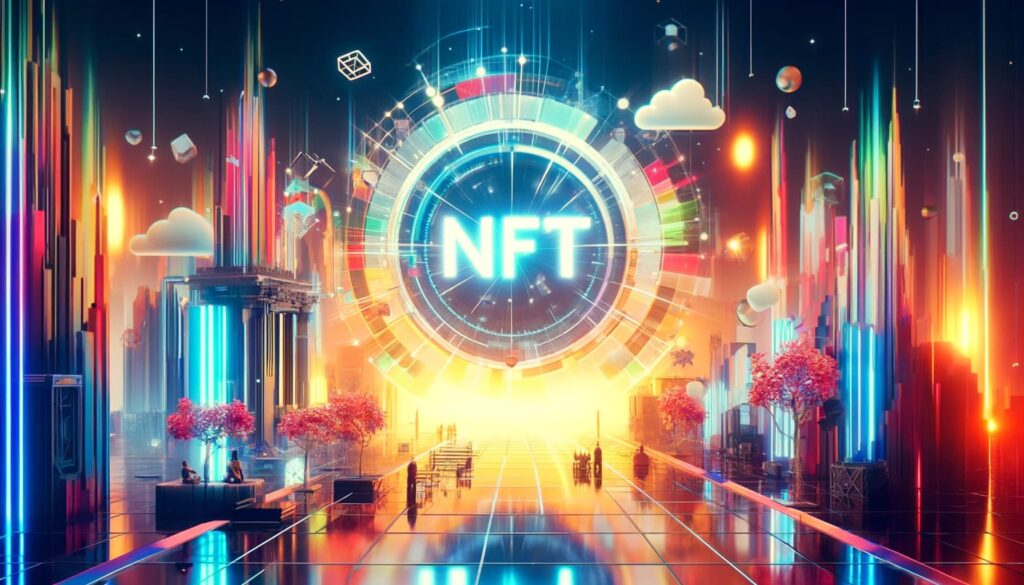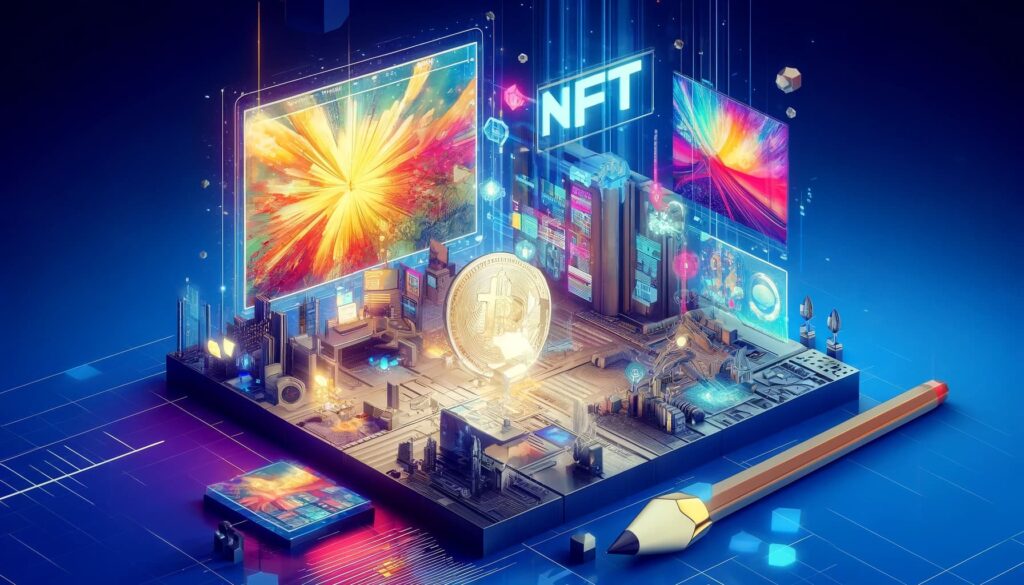Avoiding NFT Scams
In the fast-paced world of digital assets, NFTs (non-fungible tokens) have emerged as a revolutionary form of ownership and investment. However, with their growing popularity, NFT scams have also become more sophisticated, posing significant risks to both new and seasoned collectors. Understanding how to identify and avoid these scams is crucial to protecting your investments and ensuring a safe experience in the NFT market. In this blog post, we will explore common NFT scams, provide practical tips to recognize fraudulent activities, and offer strategies to safeguard your digital assets from potential threats.
NFT Investing Requires a Careful Strategy
Investing in NFTs (Non-Fungible Tokens) has become increasingly popular, with potential for high returns on investment. However, navigating the NFT market requires careful strategy and awareness. This article provides valuable tips and strategies for successfully investing in NFTs.

To increase radar for detecting blue-chip NFT projects, investors should conduct thorough research. Look for projects with established reputations, a strong community, and proven track records. Additionally, staying updated with NFT news and developments enables investors to identify emerging blue-chip projects before they become mainstream. Building a network within the NFT community can also provide valuable insights into upcoming projects.
Spotting red flags is crucial to avoid investing in scam projects or low-quality NFTs. Some red flags to watch out for include projects with no clear utility or value proposition, questionable team backgrounds, or excessive hype without substance. Conducting due diligence and analyzing project fundamentals can help identify potential red flags.
Diversifying an NFT portfolio is essential to mitigate risks. Investing in a variety of projects across different categories, including art, gaming, and collectibles, can help spread the investment across multiple potential winners. It is crucial to carefully assess each project and diversify investments accordingly.
Staying updated with NFT news and market trends is vital for making informed investment decisions. Following reputable sources, joining NFT communities, and participating in forums can provide valuable insights into the latest developments within the NFT space.
Lastly, considering the artist/creator behind the NFT project is essential. Acquiring NFTs from renowned artists or creators with a strong reputation can increase the investment's potential value over time.
By following these tips and strategies, investors can navigate the NFT market more successfully and increase their chances of a profitable investment portfolio.
Brief overview of the rise of NFTs and their popularity in the digital asset market
The world of digital assets has been revolutionized by the rise of Non-Fungible Tokens (NFTs), which have gained immense popularity in recent years. NFTs are unique digital assets that can represent ownership or proof of authenticity for various forms of digital content, such as art, music, videos, and virtual real estate. Unlike cryptocurrencies, which are fungible and can be exchanged on a like-for-like basis, NFTs are indivisible and cannot be replicated, making them highly desirable in the digital marketplace. Their popularity has skyrocketed, attracting artists, collectors, and investors alike, as NFTs offer new avenues for creativity, ownership, and value creation. This brief overview will explore the foundational rise of NFTs and their extraordinary appeal in the digital asset market.
Understanding NFTs
Understanding NFTs and their underlying blockchain technology is of utmost importance in effectively addressing the rapidly evolving landscape of digital asset management. NFTs, or Non-Fungible Tokens, have gained tremendous popularity in recent times due to their ability to represent ownership of unique digital content, such as artwork, music, videos, and more.
Blockchain technology, which serves as the foundation for NFTs, provides a secure and transparent way to record and verify transactions. This ensures that the ownership and provenance of NFTs can be reliably tracked and authenticated. Without a deep understanding of blockchain technology, it becomes challenging to grasp the intricacies of NFTs and fully appreciate their potential.
One of the main attractions of investing in the NFT marketplace is the potential for high returns. Unique digital assets, especially those created by renowned artists or celebrities, can fetch significant sums of money. However, it is essential to recognize the inherent risks associated with this emerging market. The value of NFTs can be highly volatile, and there is a risk of investing in fraudulent or stolen digital assets.
To navigate the NFT marketplace effectively, businesses must implement robust security measures and compliance guidelines. This includes utilizing secure and reputable platforms for trading and storing NFTs, conducting thorough due diligence on the legitimacy of digital assets, and ensuring compliance with relevant regulations, such as anti-money laundering (AML) and Know Your Customer (KYC) requirements.
Understanding NFTs and their underlying blockchain technology is paramount in effectively addressing the evolving landscape of digital asset management. While there is potential for high returns on investment in the NFT marketplace, businesses must also be aware of the associated risks and take appropriate security and compliance measures.
Definition of non-fungible tokens and how they differ from other digital assets
Non-fungible tokens (NFTs) are digital assets that exist on a blockchain, which is a decentralized digital ledger. Unlike cryptocurrencies such as Bitcoin and Ethereum, which are fungible, NFTs are unique and non-interchangeable. Each NFT represents a distinct digital asset, whether it be a piece of art, a collectible, or even virtual real estate.
One of the key characteristics of NFTs is their use of blockchain technology. This technology ensures that each NFT has a verifiable and immutable record of ownership. It provides transparency and security, as the ownership and transaction history of each NFT can be easily traced and verified by anyone on the blockchain network.
Another important distinction between NFTs and other digital assets is their indivisibility. NFTs cannot be divided or broken down into smaller units, unlike cryptocurrencies. Each NFT is a whole and unique entity, making it valuable and special in the digital world.
Furthermore, NFTs have gained popularity due to their ability to give creators and artists more control over their work. Through the use of programmable smart contracts on the blockchain, creators can set rules for the usage, distribution, and royalties of their NFTs. This allows them to retain ownership rights and earn a portion of the profits when their NFTs are resold in the future.
NFTs are distinct digital assets that utilize blockchain technology to provide transparency, security, and uniqueness. Their non-interchangeability sets them apart from fungible cryptocurrencies, and their use of smart contracts allows for more control and monetization opportunities for creators.
Explanation of blockchain technology and its role in NFT transactions
Blockchain technology has emerged as a transformative force with its potential to revolutionize various industries. At its core, blockchain is a decentralized ledger that records and verifies transactions across multiple computers, eliminating the need for intermediaries. This technology has found a particularly intriguing application in the realm of Non-Fungible Tokens (NFTs). NFTs are unique digital assets representing ownership or proof of authenticity of digital content, such as art, music, videos, or virtual real estate. The role of blockchain in NFT transactions is crucial, as it ensures transparency, immutability, and security throughout the entire process. In this article, we delve into an explanation of blockchain technology and explore its vital role in NFT transactions.
Risks Associated with NFTs
NFTs, or non-fungible tokens, have gained significant popularity in the digital art and collectibles space. However, like any emerging technology, there are risks associated with their use.
Firstly, market volatility is a major concern with NFTs. The value of these tokens can fluctuate dramatically, leading to potential losses for investors. Just like with any investment, it is important to carefully evaluate the market and assess the risks associated with it.
Additionally, there is a lack of liquidity in the NFT market. Unlike traditional assets, such as stocks or cryptocurrencies, NFTs often have limited buyers and sellers, which can make it difficult to buy or sell tokens quickly. This lack of liquidity can make it challenging to exit positions or capture profits when desired.
Copyright issues are another significant risk with NFTs. While NFTs represent ownership of a digital asset, they do not inherently grant copyright ownership. This means that creators may still retain copyright to the underlying artwork or content, leading to potential legal disputes or challenges.
Moreover, the NFT market has seen an increase in fraud and scams. With the rising popularity of NFTs, there has been a surge in fake or misleading tokens and platforms. It is critical for buyers to exercise caution and thoroughly research before making any purchases to avoid falling victim to fraudulent schemes.
Lastly, environmental concerns surrounding NFTs have been widely discussed. The process for minting and trading NFTs often involves significant energy consumption, primarily due to the blockchain technology underlying these tokens. This has raised concerns about the carbon footprint and sustainability of NFTs, particularly with regards to their impact on climate change.
While NFTs offer exciting opportunities in the digital space, it is important for buyers and investors to be aware of the risks associated with them. Market volatility, lack of liquidity, copyright issues, fraud and scams, and environmental concerns are all factors that should be carefully considered before engaging in the NFT market.
Lack of regulation in the NFT market
The NFT (Non-fungible Token) market has gained tremendous popularity in recent years, fueled by the digital art boom and the desire to tokenize various assets. However, one of the glaring issues with this market is the lack of regulation, which has significant implications for investors.
Firstly, the absence of investment laws and consumer protections leaves investors vulnerable to various risks. Unlike traditional financial markets, where regulations are in place to safeguard investors' interests, the NFT market operates in a largely unregulated environment. This lack of oversight allows for market manipulation and scams, where unscrupulous actors can deceive unsuspecting investors, leading to significant financial losses.
Another challenge in the NFT market is the difficulty in vetting the authenticity of tokenized assets. Given the digital nature of NFTs, it becomes challenging to verify the provenance and originality of a particular piece. This lack of authenticity vetting further exposes investors to potential fraud and counterfeit NFTs.
Additionally, the limited legal rights for NFT owners pose a significant concern. In the absence of clear regulations, disputes over ownership, copyright infringement, or fraudulent transactions can arise, leaving NFT owners with limited legal recourse.
Moreover, the self-managed nature of NFT security is a cause for concern. Unlike traditional financial institutions that have security measures in place to protect investors' assets, the responsibility of securing NFTs falls solely on the individual owner. This increases the risk of hacks, theft, and loss of valuable NFTs.
The lack of regulation in the NFT market has far-reaching implications for investors. The absence of investment laws and consumer protections, prevalence of market manipulation and scams, difficulty in vetting authenticity, limited legal rights for NFT owners, and self-managed security all contribute to the risks faced by investors in this emerging market.
Vulnerability to scams and fraudulent activities
As technology advances and our lives become increasingly connected and digitized, we face a growing vulnerability to scams and fraudulent activities. In our fast-paced world, information is readily accessible, making it easier for scammers to gather personal data and exploit unsuspecting individuals. With the rise of online shopping, banking, and communication, we often find ourselves sharing sensitive information through various platforms, inadvertently giving scammers a window of opportunity.
These fraudsters use various tactics to deceive and manipulate their victims, often targeting the elderly, immigrants, and those who are less technologically savvy. Understanding the common types of scams and fraudulent activities, as well as learning how to protect ourselves and our loved ones, is crucial in safeguarding our finances and personal information. By remaining vigilant, questioning suspicious messages or requests, and keeping up to date with the latest security measures, we can minimize the risk of falling victim to these scams and continue to enjoy the convenience and benefits that technology brings.
Researching Before Investing
Researching before investing is of utmost importance as it allows individuals to make informed decisions and minimize the risks associated with investing their hard-earned money. By conducting thorough research, investors can gain valuable insights into a company's financial health, industry trends, competitors, risk factors, and the competency of the management team.
Firstly, analyzing a company's financials is essential to understand its profitability, liquidity, and overall financial stability. This information can help investors determine if the company is a worthy investment. Evaluating industry trends is another crucial step as it helps identify market growth potential and sustainability of the company's products or services.
Furthermore, assessing competitors allows investors to understand the company's position within the industry and its competitive advantages or disadvantages. This knowledge is vital in determining whether the company has a strong market presence and a sustainable competitive edge.
Considering risk factors is also important before investing as it helps identify potential threats and challenges that may impact the company's performance. Analyzing risk factors allows investors to assess the downside potential and make appropriate risk-reward assessments.
Lastly, reviewing the management team is crucial to gain confidence in their ability to effectively run the company. Their experience, track record, and alignment with shareholders' interests play a significant role in the success of the investment.
Thorough research before investing is imperative for individuals seeking to make informed investment decisions. It involves analyzing company financials, understanding industry trends, evaluating competitors, assessing risk factors, and reviewing the management team. By considering these aspects, investors can enhance their chances of making profitable investments and managing risks effectively.
Importance of conducting thorough research on the project or platform offering the NFT
Conducting thorough research on the project or platform offering the non-fungible token (NFT) is of utmost importance for potential investors. This research encompasses analyzing factors such as token authentication processes, digital wallet security protocols, and applicable regulations.
Firstly, understanding the token authentication processes is crucial to ensure the authenticity and uniqueness of the NFT. Token authentication helps prevent counterfeits and fraud, protecting investors from purchasing fake or copied items. Thorough research on the project or platform's authentication mechanisms will provide crucial insights into the reliability and credibility of the NFTs being offered.
Secondly, evaluating the digital wallet security protocols is essential in safeguarding investment. Digital wallets hold the NFTs, and any security breaches can lead to loss or theft. It is important to research the platform's security measures, such as encryption techniques, backup options, and multi-factor authentication, to ensure the protection of digital assets.
Moreover, analyzing the applicable regulations is vital for legal compliance and investor protection. Different jurisdictions may have varying rules regarding the creation, sale, and ownership of NFTs. Thorough research will help investors identify the regulatory landscape and ensure they engage with platforms or projects that adhere to these regulations.
Conducting thorough research also contributes to efficient and accurate tax reporting. Proper documentation of transactions is necessary to comply with tax regulations. Investors need to keep records of their purchases and sales, including details such as transaction dates, prices, and platform fees. This documentation is crucial for accurate tax reporting, ensuring that investors fulfill their tax obligations and avoid any potential penalties or legal issues.
conducting thorough research on the project or platform offering the NFT is essential for various reasons. It helps investors evaluate token authentication processes, digital wallet security protocols, and applicable regulations. Additionally, proper research facilitates accurate tax reporting by ensuring proper documentation of transactions. By prioritizing research, investors can make informed decisions and protect themselves in this emerging and dynamic market.
Checking the credibility of the creators or sellers involved
In today's interconnected world, where information and products are readily available at the click of a button, it has become increasingly important to verify the credibility of the creators or sellers involved. Whether it is an online article, a social media post, or an e-commerce website, it is crucial to ensure that the sources behind these platforms are trustworthy and reliable. With the rise of fake news, scams, and fraudulent activities, it is essential to exercise caution and perform due diligence before accepting information or making a purchase. By checking the credibility of the creators or sellers involved, we can safeguard ourselves against misinformation, deception, and financial losses.
Identifying Red Flags
Identifying red flags is crucial for recognizing potential issues or problems in various situations. These warning signs help us take appropriate actions to prevent or mitigate any negative consequences. Here are key indicators to look out for:
1. Sudden changes: Any abrupt and unexplained alterations in behavior, performance, or outcomes can indicate a problem. For example, if an employee who was previously punctual starts showing up late and missing deadlines, it could be a red flag for personal or professional issues.
2. Lack of transparency: When there is a lack of openness or honesty in communication or financial matters, it can signify potential problems. For instance, if a company consistently conceals financial statements or evades questions regarding its finances, it may indicate financial irregularities or fraud.
3. Missing deadlines or targets: If a person or organization consistently fails to meet established deadlines or achieve targets, it may be indicative of poor planning, inefficiency, or lack of resources. For instance, if a contractor continuously misses project milestones without valid explanations, it can raise concerns about their competence or reliability.
4. Declining satisfaction or feedback: A decline in customer satisfaction or feedback can be a significant red flag. For example, if a sudden increase in customer complaints about faulty products or poor service quality is observed, it may signify a decline in the organization's standards or inadequate quality control measures.
To interpret these red flags, it is essential to assess patterns, gather additional information, and take appropriate steps. Addressing these warning signs promptly can help prevent further issues and minimize potential damage. Recognizing and acting upon red flags empowers us to make informed decisions and mitigate the impact of potential problems.
Common signs of potential scams in the NFT market
The NFT market, although thriving and revolutionary, is not immune to scams. It is essential to be aware of common signs that can indicate potential fraudulent activity.
One of the first red flags to look out for is exaggerated promises. Scammers often use enticing words and guarantees of quick and immense profits to lure unsuspecting investors. If an offer sounds too good to be true, it probably is. Another red flag is a lack of transparency. Legitimate NFT projects will provide comprehensive information about the team behind the project, the artwork, and the technology used. If a project withholds or provides insufficient information, it should raise concerns.
Conducting thorough research and due diligence is of utmost importance before investing in any NFT. This includes researching the project itself, its team members, and the platform it is built on. Reviews, online forums, and social media channels can also provide valuable insights into the legitimacy of the project. Moreover, checking for regulatory compliance and seeking advice from financial experts can prove invaluable in avoiding scams.
Scams in the NFT market can be identified through common signs such as exaggerated promises and lack of transparency. Conducting thorough research and due diligence before investing is vital to protect oneself from potential fraudulent activities. Remember, it is crucial to stay vigilant and skeptical to navigate the evolving NFT landscape safely.
Warning signals to look out for when considering an investment
When considering an investment opportunity, it is essential to be vigilant and aware of warning signals that may indicate potential risks or fraudulent activities. By understanding and recognizing these warning signals, investors can make informed decisions and protect their hard-earned money. In this article, we will highlight some key warning signals that individuals should look out for when considering an investment. Being aware of these red flags can help investors avoid potential scams, financial loss, or other negative outcomes.
Secure Wallet Practices
Secure wallet practices are essential for managing and securing non-fungible tokens (NFTs) in a digital wallet. To ensure the safety of these valuable assets, it is important to follow certain measures.
First and foremost, it is crucial to use wallets provided by reputable companies. Choosing a wallet from a trusted source helps to minimize the risk of fraud or hacking. Reputable companies invest heavily in security measures to protect user assets and provide a safe environment for managing NFTs.
Utilizing multi-factor authentication (MFA) protocols adds an extra layer of security to the wallet. MFA requires users to provide multiple forms of identification, such as a password, fingerprint, or face recognition, before accessing their wallet. This significantly reduces the possibility of unauthorized access to NFTs.
Implementing cold storage methods is another recommended practice. Cold storage involves storing the private keys used to access NFTs offline, usually on a hardware device or paper wallet. By keeping the private keys offline, it becomes much more challenging for hackers to gain access and steal the NFTs.
Offline key storage is particularly important because it protects against online threats, such as malware or phishing attacks, that can compromise the security of digital wallets. It ensures that the private keys are kept secure in physical form, away from potential cyber risks.
Secure wallet practices for managing and securing NFTs involve using wallets provided by reputable companies, implementing multi-factor authentication protocols, and utilizing cold storage methods for offline key storage. These measures are crucial to safeguard the valuable and unique digital assets that NFTs represent.


